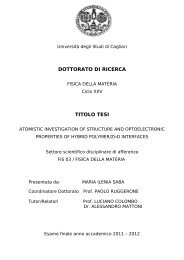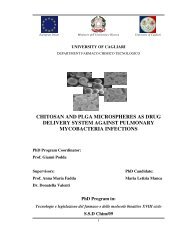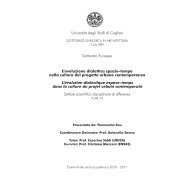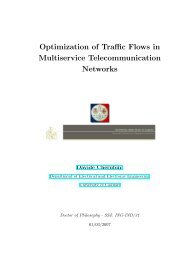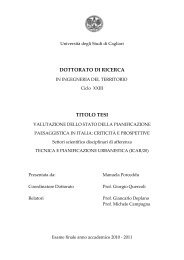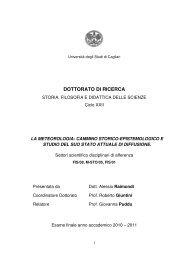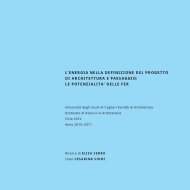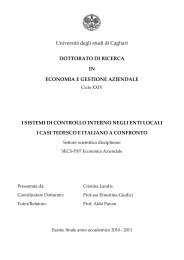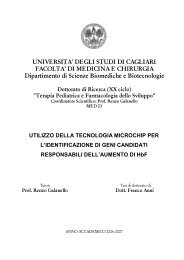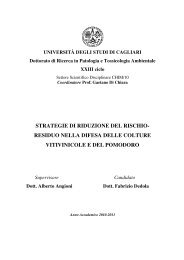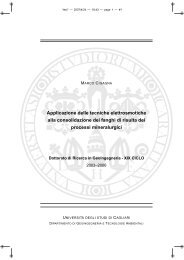The only truly alien planet is Earth. - UniCA Eprints - Università degli ...
The only truly alien planet is Earth. - UniCA Eprints - Università degli ...
The only truly alien planet is Earth. - UniCA Eprints - Università degli ...
You also want an ePaper? Increase the reach of your titles
YUMPU automatically turns print PDFs into web optimized ePapers that Google loves.
In the manner of the figure of the Ancient Mariner, Ransom violates the bond between humankind<br />
and nature by h<strong>is</strong> refusal to sacrifice any of h<strong>is</strong> remaining store of water to revive a dying swan. Like that of<br />
the Mariner, Ransom’s crime represents an assertion of the ego-mind against the claims of creature-kinship,<br />
the bond of man and nature, and thus constitutes a denial of love and compassion. Also in common with the<br />
Mariner, Ransom endures a long penance of which drought and thirst are central elements. For both the<br />
Ancient Mariner and Ransom the unconscious <strong>is</strong> the source of ultimate salvation; and for both voyagers<br />
absolution <strong>is</strong> signified by the falling of rain. Finally, both the Mariner and Ransom enact archetypal patterns<br />
of guilt and expiation, attaining through their suffering and atonement the status of redemptive figures” 225 .<br />
A questo proposito ricordiamo che Ballard contribu<strong>is</strong>ce alla raccolta di brevi saggi <strong>The</strong><br />
Pleasure of Reading (London, Bloomsbury, 1992), curata da Antonia Fraser, con un articolo nel<br />
quale commenta dieci opere, tra le quali proprio la “Rime of the Ancient Mariner”. Il poema<br />
romantico è senza dubbio un’influenza importante in Ballard, che echeggia più volte nella sua<br />
narrativa 226 .<br />
L’influenza del testo di Coleridge riaffiora per esmpio nei racconti “Storm-bird, Stormdreamer”<br />
(1966), “Tomorrow <strong>is</strong> a Million Years” (1966) e “Cry Hope, Cry Fury” (1966). Nel<br />
primo il protagon<strong>is</strong>ta uccide dei giganteschi uccelli marini mutanti, per travestirsi poi come loro,<br />
spinto dal rimorso, e venire infine ucc<strong>is</strong>o da una donna che vuole vendicare l’ucc<strong>is</strong>ione del marito e<br />
del figlio da parte di quegli uccelli. Nel secondo Glanville è uno psicopatico che ha ucc<strong>is</strong>o la moglie<br />
ma nel suo stato allucinato continua a vederla e a parlare con lei; ma la sua punizione non sembra<br />
portarlo alla redenzione. Nel terzo Melville, altro personaggio dal nome evocativo, riesce invece ad<br />
espiare la sua colpa grazie al potere purificante dell’amore 227 .<br />
In <strong>The</strong> Crystal World (1966) l’opera evocata è L’<strong>is</strong>ola dei morti (1880) di Arnold Böcklin, il<br />
cui senso di desolazione funebre ben si presta a richiamare l’atmosfera tetra, a tratti funerea, a<br />
d<strong>is</strong>petto delle luci dei cr<strong>is</strong>talli della foresta, che caratterizza le terre colpite da una sorta di lebbra<br />
225 Ibid.<br />
226 «<strong>The</strong> whole of Ballard’s fiction <strong>is</strong> haunted by echoes of Coleridge’s “Rime of the Ancient Mariner”, and it <strong>is</strong><br />
particularly appropriate that in <strong>The</strong> Drought images of dead and dying birds abound. It <strong>is</strong> as though man’s future state <strong>is</strong><br />
the same as that of the Mariner marooned in the doldrums after killing the albatross. […] <strong>The</strong> Mariner <strong>is</strong> evoked again<br />
in the short story “Storm-bird, Storm-dreamer” (1966), where the protagon<strong>is</strong>t lives on board a stalled ship rather like<br />
Ransom’s at the opening of <strong>The</strong> Drought. He slays the gigantic mutated sea-birds with h<strong>is</strong> machine gun, then suffers a<br />
slow remorse which eventually leads him to dress in feathers and take to the sky himself – <strong>only</strong> to be shot down in turn<br />
by a woman whose husband and child have been killed by the birds.» D. Pringle, <strong>Earth</strong> <strong>is</strong> the Alien Planet, op. cit., pp.<br />
23-24.<br />
227 «An allusion to Coleridge’s “<strong>The</strong> Rime of the Ancient Mariner” casts Glanville in the role of the Mariner whose<br />
pun<strong>is</strong>hment for h<strong>is</strong> heedless, self<strong>is</strong>h act of violence <strong>is</strong> undertaken by the female spirit known as “the Nightmare Life-in-<br />
Death”. Like that of the Mariner, Glanville’s crime may be seen to represent a denial of the primary reality of the<br />
unseen world and a transgression against h<strong>is</strong> own deepest nature, though unlike the Mariner’s there <strong>is</strong> no indication<br />
given here that Glanville’s sufferings will refine him or lead him to greater moral and metaphysical awareness. <strong>The</strong><br />
character of the retribution v<strong>is</strong>ited upon both the Mariner and Glanville <strong>is</strong> the same, however, a living death. […] In<br />
th<strong>is</strong> instance the Mariner figure, Robert Melville, succeeds in expiating h<strong>is</strong> guilt through love, while it <strong>is</strong> the witch<br />
figure of Nightmare Life-in-Death, Hope Cunard, who remains trapped in a living death of illusion.» G. Stephenson, op.<br />
cit., p. 86.<br />
- 70 -



